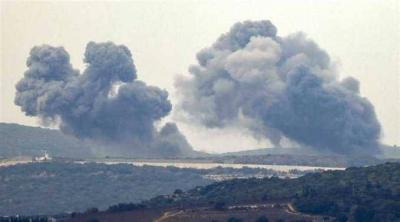The Lebanese arena has become entangled with Gaza and its war, ceasefires, and prisoner exchanges, a situation that "Hezbollah" has definitively settled by consistently rejecting any halt of the southern front as long as the war in Gaza continues. The interconnection cannot be broken despite rising pressures and threats. However, recent developments suggest that agreements are being discussed in international corridors from Washington to Paris, culminating in the Arab meeting in Riyadh that discussed the situation in Gaza and the region, which was a pivotal meeting on all levels according to "An-Nahar."
A Gulf diplomatic source in Beirut does not hide the fact that the war has overshadowed everything, but the quintet committee responsible for encouraging the Lebanese to agree on electing a president has not ceased its efforts or slowed its role, as rumored. The current priority lies in the regional situation, where there are significant anxieties and fears of an all-out war, from which Lebanon is not exempt, and the threat looming over it is greater than ever.
According to reliable information, there are preparations for Israel to launch a large-scale attack against Lebanon. Following this atmosphere, Saudi Arabia has taken action at the highest levels, and the Riyadh meeting is evidence of this, tied to communications with relevant parties from Washington to Paris and the UK. Saudi Crown Prince Mohammed bin Salman was firm when he stated that there would be no normalization before a two-state solution, a matter that remains a fundamental principle; thus, discussions and high-level diplomatic communications are underway amidst a race between total war and resolution.
U.S. Secretary of State Antony Blinken was informed by Saudi officials about what could be done to avert this war and restrain Israel from its aggressions, avoiding the worst-case scenarios. He revealed that the upcoming weeks would be crucial regarding the truce process, ceasefire, and overarching settlement topics before it is too late.
In this context, informed political sources have indicated to "An-Nahar" that the quintet committee is monitoring and following the situation in Gaza to determine the implications for Lebanon. Communications and consultations among its components have not ceased, and the Saudi ambassador Walid Bukhari is in Riyadh, active in preparing for the forthcoming quintet meeting in Saudi Arabia. Discussions are ongoing about the format of this meeting, which may be held at the level of foreign ministers if conditions and data necessitate it. However, the nature of the ongoing communications is not yet defined.
In other words, developments along the southern line—Gaza to the Rafah crossing—are considered priorities overruling others, amid fears of an increase in field operations in the south as they begin to deviate from the rules of engagement, reaching Nabatiyeh, the borders of Jezzine, and phantom airstrikes deep within Lebanon. Moreover, there has been destruction and devastation in border villages, as sources in the South Council report over 600 destroyed homes, 8,000 affected individuals, 250 martyr fighters, and 24 civilians.
It is noted that the meeting convened by the head of the South Council, Hashem Haidar, with the Union of Municipalities in the South aims to devise plans to secure the needs of the displaced residents moving toward the southern interior, exceeding 80,000, including those migrating to Beirut and other areas. Hashem confirms to "An-Nahar" that amidst the ongoing battle, accurate statistics cannot be attained until after the war, but in collaboration with the Union of Municipalities in the South and concerned parties, exceptional efforts are underway to ensure essential supplies for resilience across all social, humanitarian, and medical fronts, deciding that this is a priority for them.
Finally, it is evident from the atmosphere and information from both internal and external sources that Lebanon is caught in Gaza's grip and cannot escape except through a separation process, ideally through international intervention. Signs of this are beginning to emerge from the proposal put forth by French Foreign Minister Stéphane Séjourné, aimed at supporting the Lebanese army with quality equipment and providing all its necessary supplies by sending a battalion to southern Lebanon to implement Resolution 1701 and facilitate the return of displaced individuals to their villages and towns, while concurrently, Israel halts its aggressions, and residents return to northern settlements. However, under the current circumstances, relying on any proposal or solution is precarious, as the likelihood of military escalation remains possible, potentially leading to unprecedented escalation.




